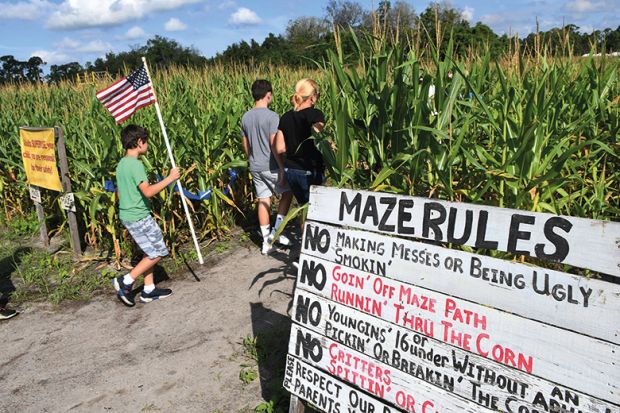In recent months there have been several instances of US institutions trying to replace terms that could cause offence, sparking controversy and giving right-wing pundits an easy target.
This month, the School of Social Work at University of Southern California (USC) said it would drop the term “fieldwork” because it “could be considered anti-black or anti-immigrant”, especially for descendants of slaves.
In December, Stanford University came under fire for the “Elimination of Harmful Language Initiative” put out by its IT department, which suggested ditching words such as “American”, “immigrant” and “webmaster”.
Following outcry, administrators at both institutions appeared to distance themselves from these measures, with USC’s interim provost emphasising that the university “does not maintain a list of banned or discouraged words” and would continue using terms including “field” that “describe our work and research”. Stanford said the language guide “does not represent university policy”.
But the incidents highlight a precarious balance in academia, as institutions wrangle with questions of how to best serve a diverse community, uphold values of academic freedom and navigate an increasingly polarised political environment.
Samuel Abrams, professor of political science at Sarah Lawrence College, believes the bigger problem is that institutions have become “very afraid” of conflict among students, to the detriment of learning.
He called his undergraduate years as a Jewish Philadelphian at Stanford University “one of the greatest” experiences of his life, crediting discussions with classmates for broadening his horizons.
“I had many fights where I went to bed confused and hurt. We had large numbers of Catholic, Asian, Mexican descent, and we clashed…and it was one of the greatest things. I learned a lot and also I became more empathetic,” he said.
“The education process should make you uncomfortable, question who you are. The fact that you’re uncomfortable shows that your biases and prejudices are being challenged.”
Professor Abrams argued that a university was a self-regulating “marketplace of ideas”, where students should be free to make mistakes and understand that the use of offensive language carries penalties, including social censure. He noted that the law already prohibits the use of hate speech.
Musa al-Gharbi, a sociologist at Columbia University and a research fellow with Heterodox Academy, a non-profit group promoting “constructive disagreement” on campuses, said university language inclusivity efforts were often tokenistic, undertaken by those with a “tenuous connection” to the marginalised.
“What these kinds of symbolic gestures do is allow people to feel like they’re ‘doing something’ in a world where they are unwilling or unable to make more substantive changes,” he said.
He worried that language changes could have the opposite effect – excluding students from working-class backgrounds who “don’t have the time and cultural capital to keep up with the ‘right’ discourse”.
Robert Henderson, a writer on class division who completed a PhD in psychology at the University of Cambridge, agreed. New terms can also ring false among those they are meant to represent, he said.
“A friend of mine came out of prison few years ago and I told him, ‘I read somewhere that you’re no longer an ex-con. You’re a justice-involved person.’ He said, ‘And you’re no longer a college grad; you’re a college-involved person.’”
Dr Henderson, who as a child experienced the foster system first-hand, noted that superficial changes to language do not change someone’s material condition: “If you told a homeless person ‘you’re unhoused’, would he say, ‘that’s great’?”
He suggested that, instead of changing language, universities with sufficient resources could spend more time directing their endowments into supporting early childhood education or identifying talented youngsters in low-income neighbourhoods.
But other scholars warned against universities scrapping any efforts to make the language used on campus more inclusive.
Darren Linvill, associate professor in social sciences at Clemson University, said that while some name changes appeared to be “performative activism” by universities, there were cases where words are worth re-examining.
“I’ve heard of name changes that have been well overdue, and ones that maybe went a little too far,” he said.
Context matters. “I work at a university that was once a literal plantation; if you were to use terms like ‘master’ or ‘fieldwork’ here, it would be totally different than if you were to use them in southern California,” Dr Linvill noted.
Recently, administrators at his university stopped calling their main building Tillman Hall – a sensible decision, he argued. “Tillman was state governor of South Carolina…he literally lynched people.”
While Dr Linvill warned that those with right-wing politics could use academia as a “scapegoat”, furthering a conservative agenda, he said that casting a harsh light on universities could also be beneficial for the system.
“Academia can look at its own navel a little too often and when some of our navel-gazing gets out into the public, I think that can be good for us. It invites critical self-reflection,” he said.
POSTSCRIPT:
Print headline: Are bans on terms like ‘fieldwork’ merely ‘performative activism’?
Register to continue
Why register?
- Registration is free and only takes a moment
- Once registered, you can read 3 articles a month
- Sign up for our newsletter
Subscribe
Or subscribe for unlimited access to:
- Unlimited access to news, views, insights & reviews
- Digital editions
- Digital access to THE’s university and college rankings analysis
Already registered or a current subscriber? Login







